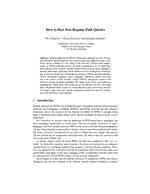How to Best Nest Regular Path Queries
Aus International Center for Computational Logic
How to Best Nest Regular Path Queries
Pierre BourhisPierre Bourhis, Markus KrötzschMarkus Krötzsch, Sebastian RudolphSebastian Rudolph
Pierre Bourhis, Markus Krötzsch, Sebastian Rudolph
How to Best Nest Regular Path Queries
Proc. 27th International Workshop on Description Logics (DL'14), volume 1193 of CEUR Workshop Proceedings, 404-415, July 2014. CEUR-WS.org
How to Best Nest Regular Path Queries
Proc. 27th International Workshop on Description Logics (DL'14), volume 1193 of CEUR Workshop Proceedings, 404-415, July 2014. CEUR-WS.org
- KurzfassungAbstract
Regular path queries (RPQs) define query patterns in terms of regular expressions and are therefore well-suited to query for paths over roles in DL. RPQs can be extended to 2-way RPQs (with converse), CRPQs (with conjunctions), or PRPQs (arbitrary positive Boolean combinations), all of which have been explored in DL research. Another natural extension of any query language is nesting, where query predicates can be defined in terms of subqueries. In this paper, we discuss several ways of introducing nesting to PRPQs, and show that they lead to increasingly expressive query languages: CN2RPQs, which were studied in the context of DLs recently; nested P2RPQs; and positive queries with transitive closure on binary predicates. The latter is one of the most expressive languages for which query answering can still be decided over DL knowledge bases. We present initial complexity results that show query answering to be non-elementary in the worst case, with an exponential increase for each level of nesting of the transitive closure operator. - Weitere Informationen unter:Further Information: Link
- Projekt:Project: DIAMOND
- Forschungsgruppe:Research Group: Computational LogicComputational Logic, Wissensbasierte SystemeKnowledge-Based Systems
@inproceedings{BKR2014,
author = {Pierre Bourhis and Markus Kr{\"{o}}tzsch and Sebastian Rudolph},
title = {How to Best Nest Regular Path Queries},
booktitle = {Proc. 27th International Workshop on Description Logics (DL'14)},
series = {CEUR Workshop Proceedings},
volume = {1193},
publisher = {CEUR-WS.org},
year = {2014},
month = {July},
pages = {404-415}
}
